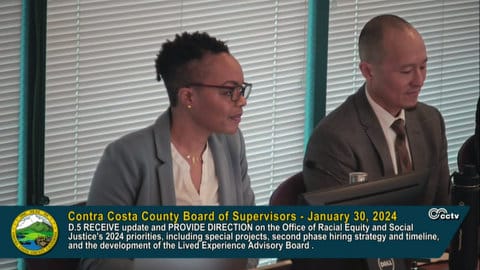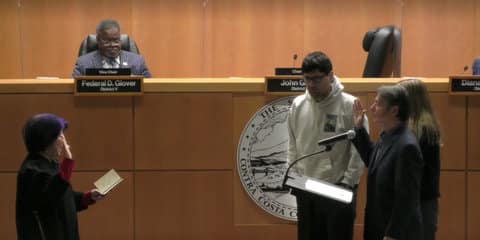
04 Feb County Racial Equity and Social Justice Leaders ‘Here to Dream Big’

Kendra Carr and Peter Kim, co-directors of Contra Costa County Office of Racial Equity and Social Justice, in Jan. 30 meeting with Board of Supervisors. (Screenshot captured by Samantha Kennedy / CC Pulse)
By Samantha Kennedy
Just months after appointing its co-directors, Contra Costa’s Office of Racial Equity and Social Justice is dreaming big.
Co-Directors Kendra Carr and Peter Kim shared at the Board of Supervisors retreat Jan. 30 that priority projects for 2024 will focus on increasing equity in the community and county system. Supervisors Federal Glover and John Gioia led the efforts on the board to create the new office.
Some of the projects include funding holistic wellness resources for African Americans, healing grants, and evaluating current implicit bias training for employees.
Another long-term goal is developing a countywide language equity access plan that grows the department’s capacity to serve those for whom English is not their first language.
The office will also create a 20-member lived experience advisory board that will provide “temperature checks” on equity in the community.
“All these projects are very aspirational,” Kim said. “We came here to dream big. These are the things we want to do, but it’s all in developmental mode.”
Carr said the priorities and projects identified by ORESJ were informed by community needs. Before Carr and Kim were appointed, several conversations were held regarding equity in the county. Residents voiced a need for increased advocacy and community engagement, addressing how some are harmed by various governmental systems, and decreasing harms experienced.
One 2022 report during those conversations incorporated survey findings and listening sessions conducted with the public that the office hopes will be used to adequately represent community needs on the lived experience advisory board. About 3,300 residents participated in the survey, and “2,600 of them indicated having experienced harms related to inequity and violence,” according to Kim. Most experiences with harm had to do with someone’s race, interactions with police and anti-immigrant attitudes.
Board membership, which will be composed to properly represent harms experienced by residents, will be half district-based and half countywide. Age will be another factor taken into consideration, according to Carr, to ensure there is representation across generations.
District 3 Supervisor Diane Burgis said some community members have shown interest in sitting on the advisory board but did not want to be publicly identified as someone having that lived experience.
“How do we show the community that we have this representation but also give people that [privacy]?” Burgis said.
Kim said that advisory members would have to disclose that they have lived experience to be considered for the position but do not have to publicly discuss that experience if they wish not to.
The Board of Supervisors will approve appointments to the advisory board and provide oversight.
“If we’re serious about improving the conditions for our most vulnerable, most harmed community members and residents, then we need to center equity in everything that we do,” Kim told the Pulse in an email. “This means that … we are intentional about eliminating racial and socioeconomic barriers so that everyone in Contra Costa, but especially our communities most impacted by inequity and who are hurting at the highest rates, have the resources, services, and information that they need to live full, healthy lives.”
The board approved a $1.26 million budget for the Office of Racial Equity and Social Justice for the 2023-24 year. Of that, $400,000 will be allocated to priority projects.
The office will also look to hire four new employees by the end of the year. Two coordinators, who will focus on language equity and reconciliation, are expected to be hired by July. A data analyst and policy & budget analyst will be hired by October.
Kim said the office is exploring the idea of piloting two small grant programs — one that provides residents and neighborhood groups with micro-grants to support their efforts when responding to crisis and trauma; and another helps emerging, grassroots organizations build capacity.
For the Record: An earlier version contained inaccurate figures for the number of people who completed a survey and the Office of Racial Equity and Social Justice budget. They have been corrected.





No Comments